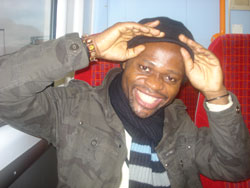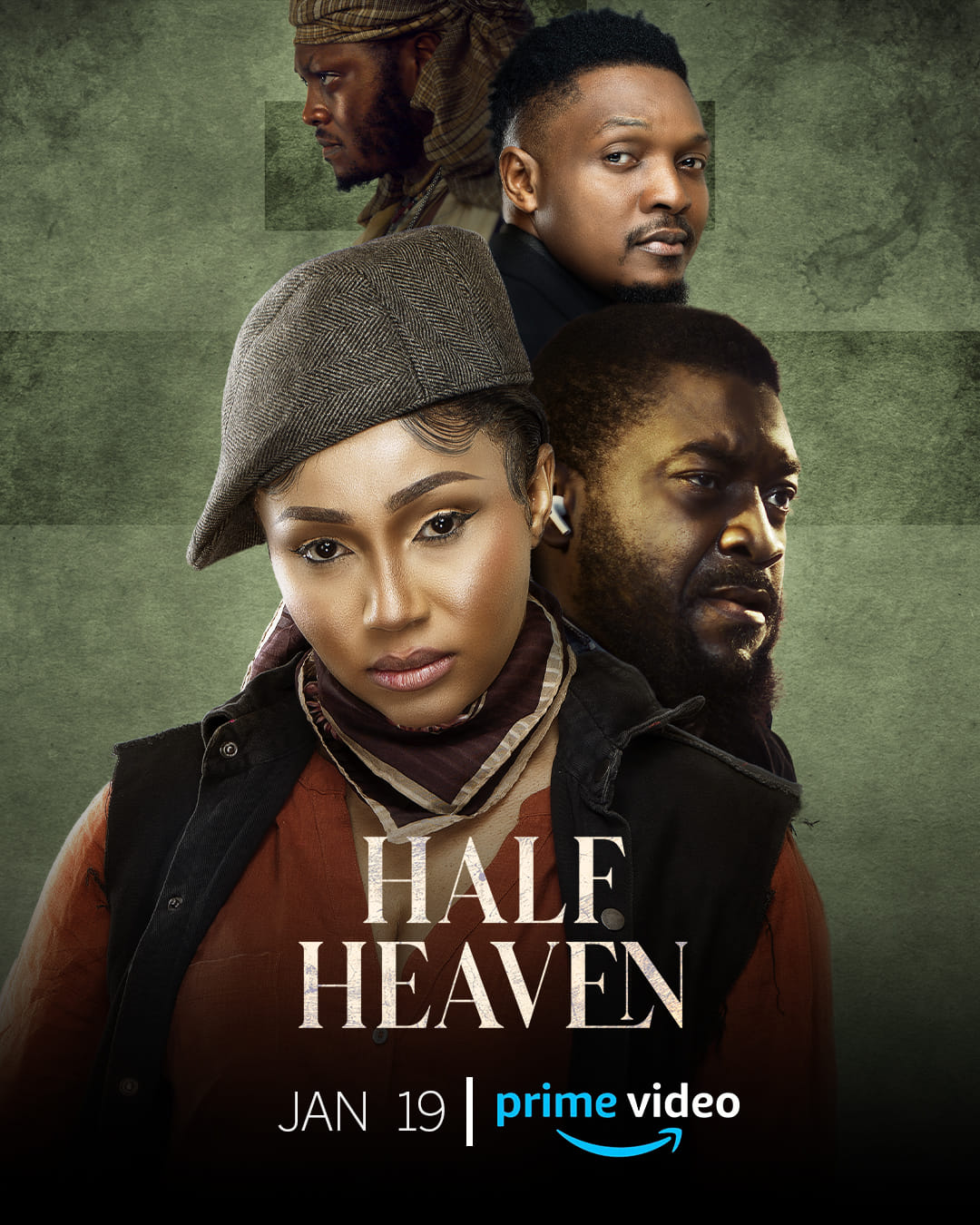
Zigoto Tchameni is a Cameroonian filmmaker. He holds a Masters Degree in Filmmaking by Practice from Kingston University in London, and obtained his BA in Performing Arts at the University of Yaounde in Cameroon. He was recently given the opportunity to complete a PhD in Filmmaking by Practice at Kingston University in London. His career began as a singer and actor, and he has performed in stage productions in France, Denmark, Belgium, Germany, Burkina Faso, Mali, Togo, Benin and Senegal.
Zigoto is a filmmaker in Zoomers Pictures, a film company based in Cameroon. He trained as a leader in the British Council InterAction Leadership Programme and has worked with underprivileged children in the UK and Cameroon.
His father had three wives and eleven children. His mother was the first wife, and had eight children. Zigoto was a street child between the ages of thirteen and sixteen-and-a-half. He came out of the streets through a regional creative theatre workshop that was supported by the Danish government.
Your connection to the British Council?
My connection with the British Council started since 2005, when I was selected to represent Cameroon in a British Council project Storylines, that interconnected five UK Filmmakers from Bournemouth Media School and five filmmakers from West Africa. This project was crafted to demonstrate the interconnectedness of cultures and to examine British relationship with countries in West Africa through filmmaking.
I later got involved in a British council InterAction Leadership Programme in Uganda and Mauritius, where we were trained as leaders and to use these leadership skills to empower people in different communities in our country and other communities around the world.
Furthermore, I obtained the British Council’s prestigious Chevening scholarship to study filmmaking at Kingston University in London, where I finally had a Masters Degree in Filmmaking by Practice.
For the past four years, I found myself confident to say that I am a successful product of the British Council and would like to collaborate and carry on other community projects with grass root communities for capacity building and sustainable development.
Your current project?
I am preparing to shoot a film on Cameroon’s History. The film is titled: Um Nyobe. It centres on the build up of Cameroon’s independence, and the role and results of the British and the French colonialism in Post-colonial Cameroon. The film would bring together a wide variety of filmmakers from India, Pakistan, UK, Jordan, China, Taiwan, Korea, Portugal, Luxembourg, France and Germany, in what can be termed ‘Intercultural film production’. The filmmakers are mostly friends and classmates from the days of my masters in filmmaking at Kingston University London.
What/who originally turned you onto film?
Between the ages of thirteen and sixteen I grew up in the streets of Yaounde, Cameroon near a cinema formerly known as ‘Cinema le Capitol’. I used to sleep in the cinema, watching movies and concerts. I unconsciously developed likeness in the art of making film. I had this stereotype when I was growing up that films were done by people from the Western world (acting and the making). It was stunning for me to watch Eddie Murphy as a black actor in Coming to America. From that moment, I started nursing that huge dream of becoming a celebrity in acting instead.
Still while in the streets, I had the opportunity of performing and doing stand-up comedy shows on Cameroon television. When I successfully came out of the streets, and went to Denmark for a regional creative theatre workshop sponsored by the International Theatre Institute, I used that as a springboard to develop and progress with my acting skills.
Back in Cameroon I acted in many television dramas: Just for Fun and Cite Campus by Vincent Ndoumbe. And in films like La Dechirure by Alfonse Beni. I started developing interest in being behind the camera during the three months production of Cite Campus. I admired the director and his managerial skills in hosting us in a confined area for three months, shooting a television series. Out of curiosity, I started asking lots of questions and he took patience in explaining film language and aesthetics to me.
After the production of Cite Campus, I assembled some friends and we shot our first movie Public Order (2003). From then on, my interest in filmmaking grew very strongly.
Career high so far?
My career high so far has been a film we shot in Cameroon in June 2007 with thirteen of my friends, colleagues and mates, who journeyed that far, from London to Cameroon, to help me in the final film for our thesis for the Masters Degree in filmmaking. This project was one-of-a-kind in my career, as we travelled successfully though hard times, with tropical mosquitoes and food poisoning. We finally returned safely to the UK with a one-hour cinematic achievement.
Also, the completion of the Masters Degree in Filmmaking by Practice and an offer that I just had from Kingston University in London to do a PhD in Filmmaking by Practice, crown my long-time dream of attaining the highest academic level in the domain of filmmaking, whereby I will further my knowledge in combining both theory and practice.
Your first job in the film industry?
My first job in the film industry was We are One, a Storylines project, where we were given grants to make a film on the interconnectedness of cultures between the UK and West Africa.
If I knew then what I know now…
I had always dreamt of becoming a lawyer. But when I went to the streets, it all changed. It may not be good when misfortune comes one’s way. One has to keep on trying, because as Ola Rotimi in The Gods are not to Blame puts it: ‘It is by trying that a monkey jumps from one tree to the other several times without falling.’
If you could have been involved in (directed, produced, acted in etc…) any film ever made, which one would it be?
It would be Um Nyobe that I am still to direct. This is because from all the films I have made since the beginning of my career, I think I am still about to shoot a film. All I have been doing are videos. Um Nyobe is going to be shot on films (16mm). Then, I must have made a film.
What’s the first film you ever saw?
Coming to America by John Landis was the first film I remember seeing. It was so memorable because I was at the age of thirteen and that is when I developed that burning anxiety to be in the film world one day.
What’s your favourite line or scene from a film?
Echoes of the Summer Sin (feature, 2009) by Steven Owen.
I love the film because it has a nice little feature and a cineframe of 25 mode which allows a progressive filming look. As well as having a cinema tone gamma, which will give it more of that cinematic look and feel.
My favourite line in a film is: ‘Never use “no” in a hostage situation’. (Danny Roman – Samuel L. Jackson) in The Negotiator by F. Gary Gray, where Danny frees hostages for a living and in turn, takes hostages to survive.
I love this line because it raises anxiety in both the audience and the other actors involved in the scene and the film. This line helps to intensify the entire drama of the film and enhances the plot.
Favourite screen kiss?
My favourite screen kiss is in: Coming to America by John Landis. This is when Akeem (Eddie Murphy) kisses Lisa in the bar scene. This is because Akeem seems to have found someone who loves him for who he is and not what he is.
Who’s your favourite screen hero/villain?
My favourite screen hero is Samuel L. Jackson in The Negotiator – I love him because he is just living and not acting the role. One would feel that he is a true and real villain.
Who would play you in the film about your life?
The person who would play me in the film about my live would be an actor who speaks from the heart, and not just the mouth.
source: http://www.britfilms.com/spotlight/zigototchameni/


 Well, I think the CEA was a very shallow and misgu... More...
Well, I think the CEA was a very shallow and misgu... More... This is creativity we are talking about, this are ... More...
This is creativity we are talking about, this are ... More... Lovelyn,your pre-selection criterias are ok but i'... More...
Lovelyn,your pre-selection criterias are ok but i'... More... camhood 4 the better More...
camhood 4 the better More... fame is gd More...
fame is gd More... CONGRATULATION. THANK GOD FOR YOU GUYS. CAMEROON S... More...
CONGRATULATION. THANK GOD FOR YOU GUYS. CAMEROON S... More... cool girls dat was great but this year we the cons... More...
cool girls dat was great but this year we the cons... More...